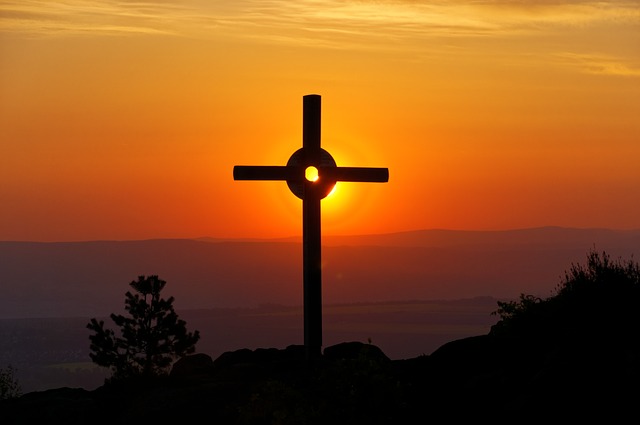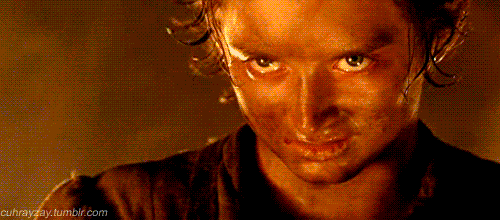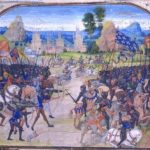Frodo’s Failure—When Doing Your Best Isn’t Enough
Frodo isn’t a hero.
Before you denounce me for a Middle-earth heretic or accuse me of being controlled by the power of the Ring, let me offer an explanation.
The typical progression of a story goes something like this:
- We meet a new character
- We come to know and like said character
- Conflict arises, requiring said character to act
- Said character goes on a journey (usually of both the internal and external variety)
- Said character must defeat the enemy as part of the plot
As far as heroes go, Frodo is fine—until that last point. Generalizing can be dangerous when it comes to stories, because no two stories are created equal. However, in this instance, it’s helpful. Keeping that in mind, the hero *should* end up saving the day, whatever that looks like.
Frodo came close. Oh so close. Yet, at the turning point, the moment when everything hung in the balance, he faltered and claimed the Ring for himself.
He didn’t complete his quest to destroy the Ring and thereby save Middle-earth from Sauron.
What are the implications?
- That Gandalf’s faith in the ability of hobbits was misplaced or misguided?
- That Frodo wasn’t the one cut out for the job?
- That the toll of the quest and the siren call of the Ring finally made him snap?
- That Sam is the true hero of the story?
Possibly, and my intention isn’t to debate the what-ifs and whyfors. What I want to focus on is the fact that by any standard, Frodo did more than his best (if that’s even possible). He gave his all to the quest.
He left home. He trudged for hundreds of miles. He fought. He submitted to the burden of the Ring and the myriad trials—physical and psychological—such an act entailed.
And in the end, it wasn’t enough. Because what good is running a marathon when you collapse fifteen feet from the finish line, unable to rise?
To Fail or Not to Fail
How many times are we told to do our best, that giving everything you have is all anyone can ask? That’s partially true, but it leaves situations like Frodo’s failure out of the picture.
The lesson here is startling yet profound. Though Lord of the Rings isn’t allegorical or overtly Christian, its themes and substance stem from Tolkien’s Christian worldview and as such present glimmers of truth throughout.
This image—Frodo’s failing despite his best effort—gets at the heart of the Gospel and the fact that left to ourselves, we can try-try-try all the livelong day and never measure up to what God requires. Never hope to come close.
Granted, the analogy breaks down because Frodo could have accomplished his task, indeed was on the verge of doing so, whereas we are utterly unable to live perfectly as God demands.
What’s the point in all this? To see the golden shafts of truth and hope woven into this dark moment of failure. Yes, Frodo failed, but did the quest?
No. Sauron was destroyed.

Image from Pixabay
In the same fashion, we can take heart that our constant failings aren’t the end of the story. In fact, they’re where the story begins. The story is that of redemption.
Where we failed, Christ didn’t.
Where we sinned, he lived the perfect life.
Where we gave in to defeat, he conquered.
I don’t know how often people think of this moment in Frodo’s quest, but it’s a defining moment of the entire story. When framed with the lens of the deeper meaning running beneath the surface, it goes from an instant where everything went terribly wrong to a promise of hope beyond despair.
A eucatastrophe, as Tolkien termed it.
And that is a comfort to remember.
Next time you read Lord of the Rings or watch Return of the King, remember that truth. Next time you want to look at the many ways you’ve failed, remember the One who didn’t fail.










































Wonderful article.
Hey, bro. I have a habit of not commenting if I agree and saying quite a lot if I don’t. Trying to break that trend here–I really enjoyed that analysis. It gave me a new way to look at LOTR that I’d never thought of before. Thanks!
The books I’ve read about “the hero’s journey,” plot skeletons, and the like have said (to oversimplify significantly) that the essentials are in what leads up to the climax, and what happens at the climax is what determines what kind of story it is: if the Hero succeeds, it’s what was once called a comedy, while if the Hero fails it’s a tragedy, for example. What’s unique about *Lord of the Rings* is that Tolkien managed a story where the Hero failed at the eleventh hour, and yet the Quest succeeded, without resorting to *deus ex machina*.
I’ve also heard (over and over, since my parents have been in a Mythopoeic Society discussion group that spends every other meeting on a work by one of the Inklings since before I was born) that this ending was drawn naturally from Tolkien’s theological convictions as a Roman Catholic, so the Ring was so powerful in temptation that even Frodo *could not* have succeeded in resisting it. That idea doesn’t “ring true to Scripture” for me, though the idea that he *didn’t* succeed in resisting in the end of course does.
I’ve read that when someone asked Tolkien why Frodo “failed” in the end, Tolkien said, “because God gives us enough strength, but not more than enough, to do what He needs us to do.” That’s a paraphrase, since it’s been so long that I read it, but that always stuck with me.
Thought provoking post, Zach. Thanks. I think this illustrates Tolkien’s creativity and challenges us today to be writers who don’t settle for what everyone else says ought to be the way our story works. We can actually take the conventional and do something more that makes the story memorable and deeper, all at the same time.
Becky
I don’t agree that this is the most accurate lens on Frodo’s “triumph” because Frodo’s has no Savior. The Ring devoured his identity until he could not destroy it when push came to shove, because enough of himself had been hollowed out. The Ring both knawed his insides and occupied the wound.
There is no Gollum ex Machina.
I see in Frodo’s “victory” the lesson that Triumph is a state of strength that must have an interior depth to one’s external victory. Think of Aragorn. He fought valiantly and united Men under the Crown of Gondor. But he became a better man on the journey, a man worthy to be king and fulfill the hopes of all in Middle Earth for a new Golden Age. Would he have “won” if he’d become a worse man because of all the pressure? If he’d become violent and angry and a “Mad King” due to war PTSD, who burned Arwen alive during an insane psychotic episode?
Frodo’s didn’t win. Even though he won for everyone else. It shows me how not with it chasing that image of Hero, really is. You can be everyone else’s champion, but if you’re not your own – that can’t be replaced.
Keep writing Zachary. I like when you find life lessons outa this stuff. Especially when I punch holes in it – “worthy opponent” critique, etc….This Beats typical Bible study Workbooks. I always figured if one day someone invited me to a “Christian cell group” studying the “Parables” of Spec. Adventure or comic book movies – I might actually say yes.
Really makes me think it might be cool to create a character with a similar dilemma who by themselves could not perform the task, but had to be pushed into it. In a way, Smeagol ended up being the hero when he forcibly took the ring from Frodo and fell with it into the fires of Mt. Doom.
I read everyone’s comments before I left mine, and I find Khai’s comment interesting, but I can’t agree with it. He said, “You can be everyone else’s champion, but if you’re not your own – that can’t be replaced.”
If I’m my own champion, that negates what Christ did for me. It is precisely because I could never be my own champion that I needed a Savior. The same with Frodo. Who was the REAL champion in LOTR, anyway? Could it be the same Champion as in the Book of Esther – unnamed, but still God?